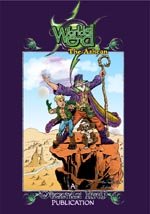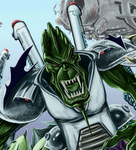The latest news from the USA…
Hi Guys,
I received this on Friday evening and thought I would post the updated news as usual. Sorry it’s a bit late, but it has been manic here, to say the least, these past few days.
FROM THE ILLUSTRATORS' PARTNERSHIP
Orphan Works and the Google Book Settlement / Part III
10.2.09
Compelling Arguments
On September 10, 2009, Marybeth Peters, Register of the US Copyright Office, testified before Congress in opposition to the Google Book Search Settlement. Her arguments on behalf of creators’ rights are compelling and we support them. However, we note with some irony that they are nearly identical to the arguments we made in opposing the Orphan Works bill last year. We don't know what conclusions to draw from this fact, but we think it's fair to draw attention to it.
We've picked several examples below and matched them with quotes from our own writings and testimony. In every case, the emphasis is ours.
Marybeth Peters on the Google Book Settlement: "The [Google] settlement is not merely a compromise of existing claims, or an agreement to compensate past copying and snippet display. Rather, it could affect the exclusive rights of millions of copyright owners, in the United States and abroad, with respect to their abilities to control new products and new markets, for years and years to come."
IPA on the Orphan Works Bill: The bill's sponsors say it's merely a small adjustment to copyright law. In fact...its provisions have been drafted so broadly it will orphan the work of working artists. Its consequences will be far reaching, long lasting, perhaps irreversible and will strike at the heart of art itself."
Marybeth Peters on the Google Book Settlement: "[The Book Rights Registry] is likely to have the unfortunate effect of creating a false database of orphan works, because in practice any work that is not claimed will be deemed an orphan."
IPA on the Orphan Works Bill: "As clients come to rely on these [visual arts] registries as one-stop shopping centres for rights clearance, any works not found in the registries could be infringed as orphans."
Marybeth Peters on the Google Book Settlement: "Compulsory licenses... are scrutinized very strictly because by their nature they impinge upon the exclusive rights of copyright holders...By its nature, a compulsory license 'is a limited exception to the copyright holder's exclusive right . . . As such, it must be construed narrowly.'"
IPA on the Orphan Works Bill: "[The Orphan Works bill] radically abridges the fundamental principal of exclusive rights granted to creators under the copyright law, and creates a sweeping compulsory license permitting large scale unauthorized use of not only older works, the provenance of which may be difficult to determine, but also of the valuable contemporary works that are the economic life blood of those in our profession."
Marybeth Peters on the Google Book Settlement: "Compulsory licenses are generally adopted by Congress only reluctantly, in the face of a marketplace failure."
IPA on the Orphan Works Bill: "The Copyright Office only received about 215 relevant letters to their Orphan Works Study. From this they deduced a claim of widespread market failure in commercial markets..." " But the Copyright Office studied the specific subject of orphaned work. They did not inquire about the workings of commercial markets and there is no evidence in their report that business clients are unable to find the living authors they wish to work with. No evidence whatsoever."
Marybeth Peters on the Google Book Settlement: "In summary, the out-of-print default rules would allow Google to operate under reverse principles of copyright law..."
IPA on the Orphan Works Bill: "[The Orphan Works bill] creates the public's right to use private property as a default position, available to anyone whenever the property owner fails to make himself sufficiently available." "[I]ts logic reverses copyright law."
Marybeth Peters on the Google Book Settlement: "In essence, the proposed settlement would give Google a license to infringe first and ask questions later..."
IPA on the Orphan Works Bill: "Since orphan works transactions would occur only after infringement, the rights holder would have no leverage to bargain for more than the infringer is willing or able to pay."
Marybeth Peters on the Google Book Settlement: "[C]opyright law has always left it to the copyright owner to determine whether and how an out-of-print work should be exploited."
IPA on the Orphan Works Bill: "Under copyright law, no author can be compelled to publish his or her work. So by what right of eminent domain can Congress give strangers the right to publish our work without our knowledge, consent or payment?"
Marybeth Peters on the Google Book Settlement: "The broad scope of the out-of-print provisions and the large class of copyright owners they would affect will dramatically impinge on the exclusive rights of authors, publishers, their heirs and successors."
IPA on the Orphan Works Bill: "The fundamental problem with the Orphan Works Act is that it's been drafted so broadly its use cannot be confined to real orphaned work situations." "To redefine an orphaned work as "a work by an unlocatable author" is to radically re-define the ownership of private property...Since everybody can be hard for somebody to find, this voids a rights holder's exclusive right to his or her own property."
Marybeth Peters on the Google Book Settlement: "Some foreign governments have raised questions about the compatibility of the proposed settlement with Article 5 of the Berne convention, which requires that copyright be made available to foreign authors on a no less favourable basis than to domestic authors, and that the "enjoyment and exercise of these rights shall not be subject to any formality."
IPA on the Orphan Works Bill: "[P]utting pressure on creators to subsidize the creation of privately-owned registries violates the intent of international copyright law, specifically Article 5(2) of the Berne Convention: "The enjoyment and the exercise of these rights shall not be subject to any formality."
Marybeth Peters on the Google Book Settlement: "The ability of copyright owners and technology companies to share advertising revenue and other potential income streams is a worthy and symbiotic business goal that makes a lot of sense when the terms are mutually determined. And the increased abilities of libraries to offer on-line access to books and other copyrighted works is a development that is both necessary and possible in the digital age. However, none of these possibilities should require Google to have immediate, unfettered, and risk-free access to the copyrighted works of other people. They are not a reason to throw out fundamental copyright principles; they are a pretext to do so."
IPA on the Orphan Works Bill: "The Internet has created a culture of appropriation; and immediate global access to artistic works has facilitated piracy, unintentional infringement and plagiary. But instant and unrestricted access to work should not be construed as a necessity just because technology has made it a possibility. That an artist's work now can be instantly transmitted around the world without the artist's permission or control does not justify a user's 'right' to take the work."
Marybeth Peters on the Google Book Settlement: "[T]he settlement would inappropriately interfere with the on-going efforts of Congress to enact orphan works legislation in a manner that takes into account the concerns of all stakeholders as well as the United States' international obligations."
IPA on the Orphan Works Bill: "This bill has been drafted behind closed doors, without a needs-assessment study, an economic impact analysis, or an evaluation of how the public would be affected by this transfer of private property from individuals to giant commercial databases...For artists, the most troubling part has been our near-total exclusion from the legislative process."
"On July 11th [2008], on behalf of all those who oppose this bill, [we] submitted Amendments to the Subcommittee on Courts, the Internet and Intellectual Property. Those Amendments would make this bill a true orphan works bill. The Amendments have never been considered...This is no way to re-write U.S. copyright law."
Q.E.D.
The Register's full testimony from September 10, 2009 can be found here.
Our comments have been excerpted from various articles posted in 2008 on the IPA Orphan Works blog.
Brad Holland and Cynthia Turner for the Board of the Illustrators' Partnership
______________________________________________________________
For news and information, and an archive of these messages:
Illustrators' Partnership Orphan Works Blog
Over 85 organizations opposed the last Orphan Works bills, representing over half a million creators. Illustrators, photographers, fine artists, songwriters, musicians, and countless licensing firms all believe this bill will harm their small businesses.
If you received our mail as a forwarded message and wish to subscribe to the IPA mailing alerts, click on the link below, "Join Our Mailing List" and follow the simple directions on the webpage.
Please post or forward this message to any interested party.
As always, I will post more here, as the news comes in.
Does this mean the US Congress will see sense, or will corporate power overrule all sense in the matter?
I, for one, hope it is the former.
For the moment, at least for me, it's back to digitally painting Worlds End
Until next time have fun!
Tim Perkins…
October 7th 2009
How to search this blog
3 months ago












































No comments:
Post a Comment